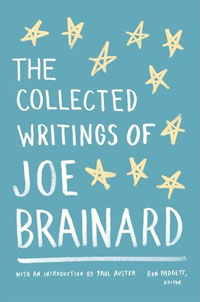 The Collected Writings of Joe Brainard
The Collected Writings of Joe Brainard
by Joe Brainard
Ed. Ron Padgett
Introduction by Paul Auster
Library of America, March 2012
450 pages / $35 Buy from LOA or Amazon
There are several Joe Brainards you may or may not know. There’s Brainard the internationally-showing collage artist and painter, and there’s also the Joe Brainard who was a downtown NY scene fixture in the poetry world in the ‘60s and ‘70s. The Joe Brainard you probably know, though, is the author of the “cult classic” I Remember, first published in full form in 1975. Written with wit, candor and no pretension to self-importance, the book is a procedural memoir, every single brief entry in the book starting with the title phrase. Rather than offering the drama or grandiosity of an amazing life, Brainard instead provides you with a non-chronological wealth of sly specificity:
I remember after people are gone thinking of things I should have said but didn’t.
I remember how much rock and roll music can hurt: It can be so free and sexy when you are not.
I remember Royla Cochran. She lived in an attic and made long skinny people out of wax. She was married to a poet with only one arm until he died. He died, she said, from a pain in the arm that wasn’t there.
READ MORE >
4 Comments
March 30th, 2012 / 12:00 pm
 Good Offices
Good Offices
by Evelio Rosero
Trans. by Anne McLean & Anna Milsom
New Directions, 2011
144 pages / $13.95 Buy from New Directions or Amazon
In September of 2011, my colleague Laura Vena and I decided that we were both sufficiently interested in Evelio Rosero’s Good Offices to attempt a “collaborative review” of the novel. (As something of a student of the novel-as-form, I was intrigued by Good Offices‘ superficial resemblance to Lewis’ atypical Gothic The Monk. Laura, though she will probably raise a protest, is an expert in Latin American literature.) Laura and I ultimately agreed that our collaboration would take the form of a conversation about the book, which we each read yet refrained from discussing prior to our officially meeting. Presented here is as full, complete and accurate a record of our conversation as Google’s transcription of our live chat will allow. What it lacks in context and gracefulness I trust it makes up for in spiritedness and candor. In fact, reading over these exchanges again, I appreciate how they allow me to eavesdrop on those selves taking turns speaking up—can I really say that they speak through me?—when I talk about books. Or: when I am retelling yet again those fictions by virtue of which we can even discuss the notion of fiction. (JM)
A word about tone: due to the candid nature of IM conversations, much of the following text is raw in character. My initial impulse was to edit out all my informal language, which reflects not my intellectual self, but the manner in which I engage in impassioned conversation with friends… Not necessarily for mass consumption. But in discussions with Joe, we ultimately felt we should maintain the tone of the original conversation to keep true to the experiment of long-distance collaboration that resulted in this review. For better or worse. (LV)
READ MORE >
1 Comment
March 26th, 2012 / 1:00 pm
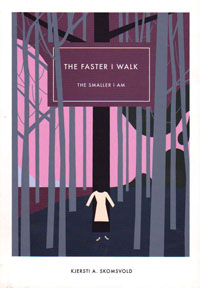 The Faster I Walk, The Smaller I Am
The Faster I Walk, The Smaller I Am
By Kjersti A. Skomsvold
Translated by Kerri A. Pierce
Dalkey Archive Press, 2011
147 pages / $17.95 Buy from Dalkey
Originally published in Norwegian as Jo Fortere Jeg GÂr, Jo Mindre Er Jeg by Forlaget Oktober A/S, 2009
Although I know I shouldn’t, sometimes I judge a book by its title.
At first glance, The Faster I Walk, The Smaller I Am might suggest some kind of self-help manual advocating weight loss by means of low-intensity cardiovascular exercise. But putting the title aside and judging instead from the book’s front cover, (something else I know I shouldn’t do,) it’s clear this could never turn out to be the case. The copy I have, the hardback Dalkey Archive Press 2011 translation, sports artwork reminiscent of a Marcel Dzama painting. In a forest of leafless trees against pink-purple sky there is a woman standing with her back to a trunk, iniscernible save for her white dress and white shoes. The woman turns out to be Mathea Martinsen, and the title turns out to be a reference to Einstein’s theory of relativity, and the book’s content turns out to be a candid portrayal of losses far greater than that of a few inches around the waistline.
Skomsvold writes from the point of view of the front cover’s indiscernible woman. Mathea is childless, widowed and “almost a hundred, just a stone’s throw away.” All of her life, she’s been overlooked. “The spun bottle never pointed at me, the neighborhood kids never found me when we played hide-and-seek, and I never found the almond in the pudding at Christmas…” Now she lives alone in the same apartment block in Haugerud, a suburb of Oslo, where she has spent all her married life. Mathea likes to knit ear-warmers, read the obituaries and start new rolls of toilet paper. She is surprisingly proud, yet appallingly lonely – so lonely she listens to the distant sound of sirens and wishes they were coming for her, so lonely her only sense of fellowship is achieved by buying the same groceries as strangers she passes in the aisles of the local store.
READ MORE >
2 Comments
March 23rd, 2012 / 1:00 pm
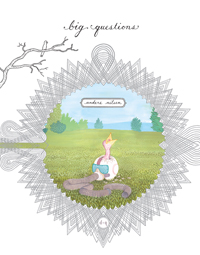 Big Questions
Big Questions
by Anders Nilsen
Drawn and Quarterly, 2011
658 pages / $44.95 Buy from D&Q or Amazon
Ends beget origins in Anders Nilsen’s Big Questions, so it’s proper that we learn about the book’s genesis in its afterword. The author-illustrator tells us the 600-page graphic novel began 15 years ago as a workshop exercise meant to incite new illustration tactics. The assignment required that the artist draw an object 60 times on 60 separate sheets of paper in one hour. In Nilsen’s case, a narrative hatched while he moved through his 60 iterations (of what he doesn’t say). He reveals that the emergent events were about “a lost soldier in a barren landscape, a group of birds, and a plane crash.” And though the characters, landscape, and frames all become more complex and more thoughtfully wrought as the book assembles itself around you, much of the narrative stays as it was when it sprang from Nilsen’s workshop piece. Big Questions in completed form houses a fable-like tale, told in discreet scenes, about finches who eat seeds and ask questions; a flat-to-rolling landscape that’s unpeopled except for a grandmother and her probably slow grandson, the idiot, both of them ostensibly mute; things that go missing; a bomb that explodes and occasions more questions; a plane that crashes (yes, more questions); and a mysterious, somnolent pilot who emerges from that plane.
READ MORE >
3 Comments
March 19th, 2012 / 1:00 pm
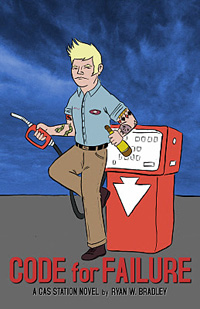 Code For Failure
Code For Failure
by Ryan W. Bradley
Black Coffee Press, March 27, 2012
255 pages / $12.95 Preorder from Black Coffee Press
When most of us make a pit stop at the local service station for a few gallons of gas, some cigarettes, or an oil change, if we’re feeling a little curious, we might stop to consider the often grizzled-seeming souls toiling behind the counter or at the pumps. What choices, either wildly spontaneous or premeditated, led them to their current career? Can we imagine their lives outside of work as distinct and complex entities and not just the bored bodies in unflattering corporate-logo jumpsuits with which we’re so familiar? Are they happy? Ryan W. Bradley can provide these answers, and then some. His autobiographical debut novel, Code for Failure, presents a searing portrait of life at the bottom rung of the fuel industry that performs the rare feat of being psychologically intricate, hilariously scatological, and emotionally memorable, often in the same paragraph. It’s a study of the rarest of dichotomies – darkly macho fiction with a heart that builds to unbearable, and maybe more.
READ MORE >
7 Comments
March 16th, 2012 / 1:00 pm
 The Flasher
The Flasher
by Adam Peterson
SpringGun Pess, 2012
60 pages / $14 Buy from SpringGun or SPD
I read 80% of Adam Peterson’s The Flasher in the bathtub, which seems entirely fitting. I’m not at all afraid to say that baths stimulate me in the same way flashing stimulates flashers. Baths compel me, they invigorate me, in some strange way they solidify my relationship to the greater world. The only difference between soaking in the tub and flashing is where one is solitary, contemplative, the other asks for a wider public, a larger stage. But both are—mysteriously no doubt—borne out of reverence for one’s place in the always-spryly grinning universe.
At its core The Flasher is a love story. A man—the flasher—falls in love with a woman—a muffin store employee—who “takes [muffin] batter off [her body] with her tongue” (31) and is possessing of what can only be described as a nuanced personality. The flasher attempts to woo said woman/muffin store employee. He fails. The end. Throughout the course of the book other things, of course, happen: the flasher visits his ailing mother in the hospital, the flasher makes french toast, the flasher uses a public restroom, the flasher swallows the Earth and diagnoses the sky. But the flasher’s relationship with his would be lover is the driving storyline, the one element of the book that—albeit obliquely—ties everything together. Without it there would be no, as it were, narrative thrust, nothing to continue to propel the reader forward.
READ MORE >
4 Comments
March 12th, 2012 / 1:00 pm
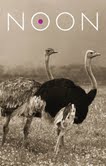 NOON Annual 2012
NOON Annual 2012
Ed. Diane Williams
$12 / Purchase directly from NOON
After reading NOON Annual 2012, I again dwelled on the nature and the value of the short-short story. I despair that short-short works are sometimes disparaged as underdeveloped and unworthy, and this issue of NOON proves the perfect response to such cynicism and dismissals.
First, the design and aesthetics of this literary magazine are first-rate. The book is smooth to the touch, bears weight, and courts the eye. There’s a smell from these pages that, while not pleasant per se, is definite. Definite is not to be underrated. This book is elegant and glamorous. Even the spine is a standout. I pored so long over Bill Hayward’s black and white photograph on page 107, the work bears my countless greasy prints. I love how the subjects here seem afloat, as if there is no ground, as if the whole point is to throw out our assumptions and re-see. Animal portrait photographer Valerie Schaff’s cover is memorable and her self-portrait on the inside cover is stunning and affecting. She writes, “When I am present, I am beyond the notion of predictability.” This quote proved my guide for the reading and the appreciation of the entire issue.
READ MORE >
7 Comments
March 9th, 2012 / 1:00 pm
 Londoners: The Days and Nights of London Now – As Told by Those Who Love It, Hate It, Live It, Left It, and Long for It
Londoners: The Days and Nights of London Now – As Told by Those Who Love It, Hate It, Live It, Left It, and Long for It
by Craig Taylor
Ecco, 2012
448 pages / $29.99 Buy from Amazon / Powells
Looking at a map of London, you see neighborhoods with familiar names such as Chelsea and Greenwich, and you see neighborhoods that sound like cheeses (Rotherhithe), erectile dysfunction pills (Vauxhall), Tolkien inventions (Isle of Dogs) and enormous breakfasts (West Ham). Maybe you’ve visited London, but for those of us who haven’t and who still harbor a deep curiosity, despite the dreary weather, bad food, soot, lootings, and long shadow of Bill Buford’s soccer hooligan book Among the Thugs, Craig Taylor’s Londoners both confirms and broadens London’s reputation as an enchanting, holy polluted kickass clusterfuck. And it does so in a way that proves as interesting as its subject.
READ MORE >
4 Comments
March 5th, 2012 / 1:00 pm
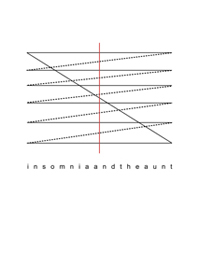 Insomnia and the Aunt
Insomnia and the Aunt
by Tan Lin
Kenning Editions, 2011
44 pages / $10 Buy from SPD / Amazon
It would be a mistake to state outright any kind of thumbs up or down regarding Insomnia and the Aunt because that would mean there’s something there to judge, and while I’m not suggesting that the book is empty, I’m arguing that the book lives up to its promise billing itself as an “ambient novel.” Both words in that phrase are tricky when dealing with a fifty page novella studded with postcard and TV photos and posed as a very hazy memoir mainly about the unnamed narrator’s relationship to his aunt, though. This titular aunt used to run a motel with her husband in rural Washington for an uncertain span of time across the final third of the 20th century and the first decade of the present one, information delivered to you sometimes in sometimes matter of fact announcement but sometimes in what could be called “ambient” fashion through slowly accruing tossed-off-seeming information. And “ambient” and “novel” normally sit askew from each other, which makes both terms problematic and the reading experience an uncertain one but in the case of the book ambient and novel work together in tandem, both forms present throughout.
READ MORE >
8 Comments
February 27th, 2012 / 1:00 pm
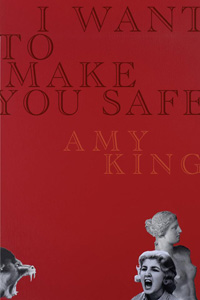 I Want to Make You Safe
I Want to Make You Safe
by Amy King
Litmus Press, 2011
87 pages / $15 Buy from SPD Books
Amy King is doing God’s work. Of course, I don’t mean God in a traditional Christian way; I mean God in the way that King speaks of God in her recent book, I Want to Make You Safe:
God is the excess
of our collective minds
of our collective wing wax
of our flights past time zones.
King’s poetry—its meandering syntaxis, its resistance to singular meanings, its mysterious connections and lack of connections—opens up the mind to unexplored avenues of thought. I also find King doing this work through her editing, specifically on the journal, Esque, which she co-edits with Ana Božičević, in which they bring together a wide array of contemporary poets and prose experimentalists, people like Jennifer Karmin, Cara Benson, Cynthia Arrieu King, Ching-In Chen and more. The new edition alone should get her a seat in heaven. If you haven’t seen the third issue, called Revolutionesque, you should definitely check it out.
READ MORE >
4 Comments
February 24th, 2012 / 1:00 pm

 The Collected Writings of Joe Brainard
The Collected Writings of Joe Brainard Good Offices
Good Offices The Faster I Walk, The Smaller I Am
The Faster I Walk, The Smaller I Am Big Questions
Big Questions  Code For Failure
Code For Failure The Flasher
The Flasher NOON Annual 2012
NOON Annual 2012 Londoners: The Days and Nights of London Now – As Told by Those Who Love It, Hate It, Live It, Left It, and Long for It
Londoners: The Days and Nights of London Now – As Told by Those Who Love It, Hate It, Live It, Left It, and Long for It Insomnia and the Aunt
Insomnia and the Aunt I Want to Make You Safe
I Want to Make You Safe